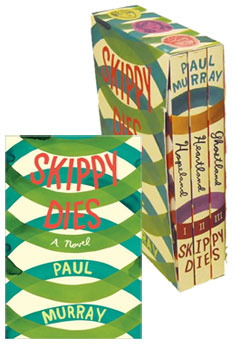Read This: Skippy Dies
 If you follow me on Twitter, there’s a good chance you know that I’m prone to crying (or nearly crying) at the movies—and not just at the expected stuff like Sounder or Rocky or Pan’s Labyrinth, but even big emotional scenes in films like Transformers leave me catching my breath. Books, though, not so much, so when I tell you that there’s a scene towards the end of Paul Murray’s new novel, Skippy Dies, where I was struggling to maintain my composure while reading on the New York subway, I hope you’ll understand just how powerful this novel is.
If you follow me on Twitter, there’s a good chance you know that I’m prone to crying (or nearly crying) at the movies—and not just at the expected stuff like Sounder or Rocky or Pan’s Labyrinth, but even big emotional scenes in films like Transformers leave me catching my breath. Books, though, not so much, so when I tell you that there’s a scene towards the end of Paul Murray’s new novel, Skippy Dies, where I was struggling to maintain my composure while reading on the New York subway, I hope you’ll understand just how powerful this novel is.
And the fantastic thing is: Just a few hundred pages earlier, I was fighting off a major case of the giggles on an airplane because there’s another scene in this book that is hysterically funny, that takes its joke and just keeps turning the dial a little bit further until… well, until I was about to explode, anyway. (Murray’s first novel, An Evening of Long Goodbyes, was equally side-splitting—based on the brilliant premise that you could still have a Bertie Wooster-like character running around the modern world… if he was completely delusional.) Balancing those two emotional extremes in the same novel could be a challenge, but Murray totally makes it work. He nails the ridiculousness of adolescence without ever losing sight of its deadly earnest and painfully raw aspects, and he brings equal honesty and empathy to his adult characters—except when he wants to make them cartoons, and then they’re brilliant cartoons.
The novel fulfills its titular promise in the darkly absurd opening scene, then backtracks to show what life was like for Daniel “Skippy” Juster at Seabrook, a Dublin boarding school, quickly expanding to absorb the perspective of several of his classmates and a few of his teachers (most importantly, in this context, Howard Fallon, a history teacher who also had a miserable time as a Seabrook student but can’t seem to break free of its gravitational pull). The story stays dark—but just when you think Murray’s about to make The Chocolate War seem optimistic, he adds another comedic twist, finally landing somewhere down the middle. Skippy Dies is easily one of my favorite novels of 2010; right now, I’m only trying to decide whether I like it better than David Mitchell’s The Thousand Autumns of Jacob de Zoet, or whether I love them both equally.
(Oh, and as you may have guessed from the picture, it’s being released simultaneously as a hardcover and a boxed set of three trade paperbacks, one for each of the main narrative arcs.)
10 September 2010 | read this |

 Our Endless and Proper Work is my new book with Belt Publishing about starting (and sticking to) a productive writing practice.
Our Endless and Proper Work is my new book with Belt Publishing about starting (and sticking to) a productive writing practice. 
